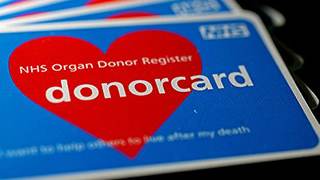British Medical Association to push for 'opt-out' organ donation
- |

The British Medical Association (BMA) is to push for an 'opt-out' system for organ donation, as doctors voted today in favour of the proposals.
The BMA, which represents 150,000 doctors, believes that an 'opt-out' system would be the best way improve the issue of donor shortages.
Medics voted to "actively lobby" the government to implement the move – yet Christian Concern and other Christian medical groups believe that the idea of presumed consent is unethical.
Deemed consent
Dr John Chisholm, chairman of the BMA's medical ethics committee, said: "Organ transplantation is an area that has seen amazing medical achievements but has not yet reached its full life-saving and life-transforming potential, so I'm pleased to see this motion pass today.
"As a doctor it is difficult to see your patients dying and suffering when their lives could be saved or dramatically improved by a transplant."
Last December, Wales introduced a system of "deemed consent", which allows people who wish to donate their organs to either register a decision to opt out, or do nothing. Deceased individuals will be presumed to have consented to organ donation unless they have previously specified otherwise.
As a result of this, 60 organs have been transplanted in the following six months. Around half of these came from those who had not given consent.
Around 24 European countries have opt-out donation.
'Silence does not amount to consent'
'Opt-out' organ donation has been highlighted to be ethically questionable by Christian Concern and others in the past. Responding to the proposals to implement the system in Wales in 2013, Christian Concern's Chief Executive,
Andrea Williams, said:
"Silence does not amount to consent. A system of presumed consent is unethical and will result in organs being treated as the property of the state rather than a voluntary gift by the donor.
"It will also undermine the relationship of trust between patients and healthcare professionals, potentially decreasing rather than increasing the number of donations."
Dr Peter Saunders of Christian Medical Fellowship has previously highlighted that 'opt-out' organ donation does not necessarily increase the number of donors.
"Donation rates in countries with 'presumed consent' laws do not actually differ from countries requiring explicit (opt-in) consent. In fact, some countries operating presumed consent systems have lower rates of organ donation!" he said.
"Differences in rates are due to other factors including the numbers of potential donors, provision of intensive care facilities, end of life care, use of transplant coordinators, trust in the donation system and trust in the medical profession (particularly those treating dying patients)."
CMF has a helpful resource that outlines further ethical concerns regarding 'opt-out' organ donation.
Related Links:
Welsh Assembly votes in favour of 'presumed consent' for organ donation
BMA to push for 'opt-out' organ donation system
Christian Medical Fellowship file 36 (2008) - organ transplantation (Christian Medical Fellowship)
